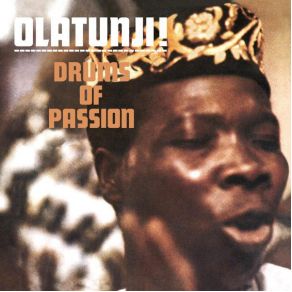Drums of Passion
Download links and information about Drums of Passion by Babatunde Olatunji. This album was released in 1959 and it belongs to Jazz, World Music, Pop genres. It contains 9 tracks with total duration of 44:15 minutes.

|
|
|---|---|
| Artist: | Babatunde Olatunji |
| Release date: | 1959 |
| Genre: | Jazz, World Music, Pop |
| Tracks: | 9 |
| Duration: | 44:15 |
| Buy it NOW at: | |
| Buy on iTunes $7.99 | |
| Buy on Amazon $36.83 | |
| Buy on Amazon $33.80 | |
| Buy on Songswave €1.50 | |
Tracks
[Edit]| No. | Title | Length |
|---|---|---|
| 1. | Akiwowo (Ah-Key-Woh-Woh) (featuring Olatunji) | 4:42 |
| 2. | Oya (Aw-Yah) (featuring Olatunji) | 5:35 |
| 3. | Odun De! Odun De! (Aw Dun Day! Aw Dun Day!) (featuring Olatunji) | 4:59 |
| 4. | Jin-Go-Lo-Ba (Jin-Go-Low-Bah) (featuring Olatunji) | 3:25 |
| 5. | Kiyakiya (Key-Ya-Key-Ya) (featuring Olatunji) | 4:13 |
| 6. | Baba Jinde (Baba-Gee-Un-Day) (featuring Olatunji) | 5:31 |
| 7. | Oyin Momo Ado (Oh-Yin-Maw-Maw-Ah-Dough) (featuring Olatunji) | 5:27 |
| 8. | Shango (Chan-go) (featuring Olatunji) | 7:02 |
| 9. | Menu Di Ye Jewe (featuring Olatunji) | 3:21 |
Details
[Edit]Having come to the U.S. from his native Nigeria to study medicine, percussionist Babatunde Olatunji eventually became one of the first African music stars in the States. He also soon counted jazz heavyweights like John Coltrane ("Tunji") and Dizzy Gillespie among his admirers (Gillespie had, a decade earlier, also courted many Cuban music stars via his trailblazing Latin jazz recordings). And, in spite of it being viewed by some as a symbol of African chic, Drums of Passion is still a substantial record thanks to Olatunji's complex and raw drumming. Along with a cadre of backup singers and two other percussionists, Olatunji works through eight traditional drum and chorus cuts originally used to celebrate a variety of things in Nigeria: "Akiwowo" and "Shango" are chants to a train conductor and the God of Thunder, respectively, while "Baba Jinde" is a celebration of the dance of flirtation and "Odun De! Odun De!" serves as a New Year's greeting. The choruses do sound a bit overwrought and even too slick at times (partly due to the fact that most of the singers are not African), but thankfully the drumming is never less than engaging. The many curious world music fans who are likely to check this album out should also be sure to look into even better African drumming by native groups like the Drummers of Burundi and the percussion outfits featured on various field recordings. [The 2002 CD reissue on Columbia/Legacy adds the track "Menu Di Ye Jewe (Who Is This?)", which was recorded at one of the 1959 sessions for the album, but was previously unissued in the US.]